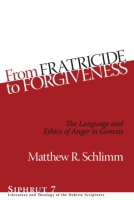From Fratricide to Forgiveness
The Language and Ethics of Anger in Genesis
Matthew R. Schlimm
In the first book of the Bible, every patriarch and many of the matriarchs become angry in significant ways. However, scholars have largely ignored how Genesis treats this emotion, particularly how Genesis functions as Torah by providing ethical instruction about handling this emotion’s perplexities. In this important work, Schlimm fills this gap in scholarship, describing (1) the language surrounding anger in the Hebrew Bible, (2) the moral guidance that Genesis offers for engaging anger, and (3) the function of anger as a literary motif in Genesis.
- Description
- Table of Contents
Genesis evidences two bookends, which expose readers to the opposite extremes of anger and its effects. In Gen 4:1–16, anger takes center stage when Cain kills his brother, Abel, although he has done nothing wrong. Fratricide is at one extreme of the spectrum of anger’s results. In the final chapter of Genesis, readers encounter the opposite extreme, forgiveness. Here, Joseph and his brothers forgive one another after a long history of jealousy, anger, deception, and abuse. It is a moment of reconciliation offered just before the book closes, allowing readers to see Joseph as an anti-Cain—someone who has all the power and all the reasons to harm his brothers but instead turns away from anger and, despite the inherent difficulties, offers forgiveness.
Although Genesis frames its post-Edenic narratives with two contrasting outcomes of anger—fratricide and forgiveness—it avoids simplistic moral platitudes, such as demanding that its readers respond to being angry with someone by forgiving the person. Genesis instead returns to the theme of anger on many occasions, presenting a multifaceted message about its ethical significance. The text is quite realistic about the difficulties that individuals face and the paradoxes presented by anger. Genesis presents this emotion as a force that naturally arises from one’s moral sensitivities in response to the perception of wrongdoing. At the same time, the text presents anger as a great threat to the moral life. Genesis thus warns readers about the dangers of anger, but it never suggests that one can lead a life free from this emotion. Instead, it portrays many characters who are forced to deal with anger, presenting them with dilemmas that defy easy resolution. Genesis invites readers to imagine ways of alleviating anger, but it is painfully realistic about how difficult, threatening, and short-lived attempts at reconciliation may be.
1. Introduction
Part 1. The Language of Anger
2. Traversing Foreign Terrain: The Troubles of Translating Emotion
3. Imposing Western Assumptions on the Text: Irrationality as Senseless Violence
4. The Hebrew Bible’s Prototypical Understanding of Anger
5. Biblical Anger’s Associative Networks
6. Biblical Anger and Conceptual Metaphor
Part 2. Daybreak after the Dim Glow of the Enlightenment: Approaching the Ethics of Genesis
7. Advances in Old Testament Ethics
8. Ethics, Emotion, and Experience: The Power of Stories
9. Ethics outside Eden: Cain and Abel
10. A Land of Limitations: Anger among Shepherds
11. Anger at the Margins
12. Attempting Reconciliation: Brothers at the End of Genesis
13. Hope in a World of Limitations: Synthesis and Conclusion
Appendix A: The Statistics of Biblical Language for Anger
Appendix B: The Language of Anger
Indexes
Mailing List
Subscribe to our mailing list and be notified about new titles, journals and catalogs.




